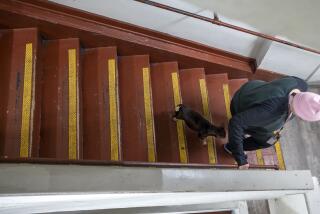Missing-Children Group Agrees to Refund Gifts
- Share via
The San Diego-based International Missing Children’s Foundation has agreed to refund $28,550 to Pennsylvania residents because of complaints that their donations were solicited through fraudulent telephone sales techniques.
Mark A. Pacella, a Pennsylvania deputy attorney general, said Monday that an “assurance of voluntary compliance” was issued last week requiring the foundation and its telephone solicitor, Colonial Corp. of Culver City, to refund the money to 91 Pennsylvania residents by Oct. 10.
The refunds, he said, stem from a telephone fund-raising campaign Colonial undertook on behalf of the foundation for two weeks during late November and early December.
Ward Leber, the foundation’s executive director, said Monday that he had no prior knowledge of the phone techniques used by Colonial representatives.
Leber added that he moved quickly late last year to inform authorities of the fund-raising problem when unhappy residents in various states targeted by Colonial began complaining to the foundation, which has been criticized recently by former employees and angry parents for not doing enough to find missing children.
“I basically made a complaint to the attorney general’s office and said that we didn’t agree with the solicitation in any way and we wanted to give the money back to the donors,” he said.
“I couldn’t believe what they were saying,” Leber said of the solicitation pitch. “It’s ridiculous.”
But Avery Einhorn, an attorney for Colonial, maintained that Leber and other foundation representatives were fully briefed on Colonial’s techniques before the fund-raising campaign began.
Pacella said that, although Leber cooperated with his office from the beginning of the case, it was the attorney general’s office that first contacted the foundation about the complaints.
Complaints About Prizes
Pacella said his office became involved in the case after Pennsylvania residents complained that prizes offered in the telephone solicitation weren’t worth as much as originally represented. A check of state records also showed that neither the foundation nor Colonial was registered with the state’s Bureau on Charitable Organizations at the time of the fund-raising campaign.
During the campaign, representatives of Colonial, a firm that markets promotional materials such as bumper stickers and buttons, called Pennsylvania residents and informed them that they had just won a prize--either a new car, $25,000 worth of diamonds or a $1,000 Brazilian emerald, Pacella said.
Residents were told that, to collect their prizes, they had to use their credit cards to purchase bumper stickers and other promotional items over the phone on behalf of the foundation, said Pacella. The purchases ranged from $179 to $525, and the residents were told they would receive notification of their prizes when their merchandise arrived in the mail.
Nobody won the car or the diamonds, said Pacella. Those willing to pay another $99 shipping and insurance charge eventually received an emerald, which came with a “certificate of appraisal” stating its value as $1,000.
But, when many residents went to local jewelers to have the emeralds reappraised, they were told the actual value ranged from nothing to $40, said Pacella.
‘You Can’t Lose’
“That was the primary fraud we were concerned with,” said Pacella. “These people were told that, regardless, you can’t lose because you would at least get an emerald and it would be worth $1,000.”
Leber said a San Diego Trust & Savings Bank account, established by the foundation to process the credit-card transactions, has been frozen until the refunds can be sorted out. Foundation attorney Harrison Dossick said Colonial has refused to provide a list of the people who were contacted during the campaign.
Dossick said Colonial also solicited people on behalf of the foundation in Georgia, Florida, Minnesota and Indiana, as well as other states he could not specify.
Pacella said both the foundation and Colonial will be required to register with the Pennsylvania state government if they want to solicit there again. Failure to comply with the voluntary agreement for the refunds by Oct. 10 may prompt legal action by the state, he added.
More to Read
Sign up for Essential California
The most important California stories and recommendations in your inbox every morning.
You may occasionally receive promotional content from the Los Angeles Times.










